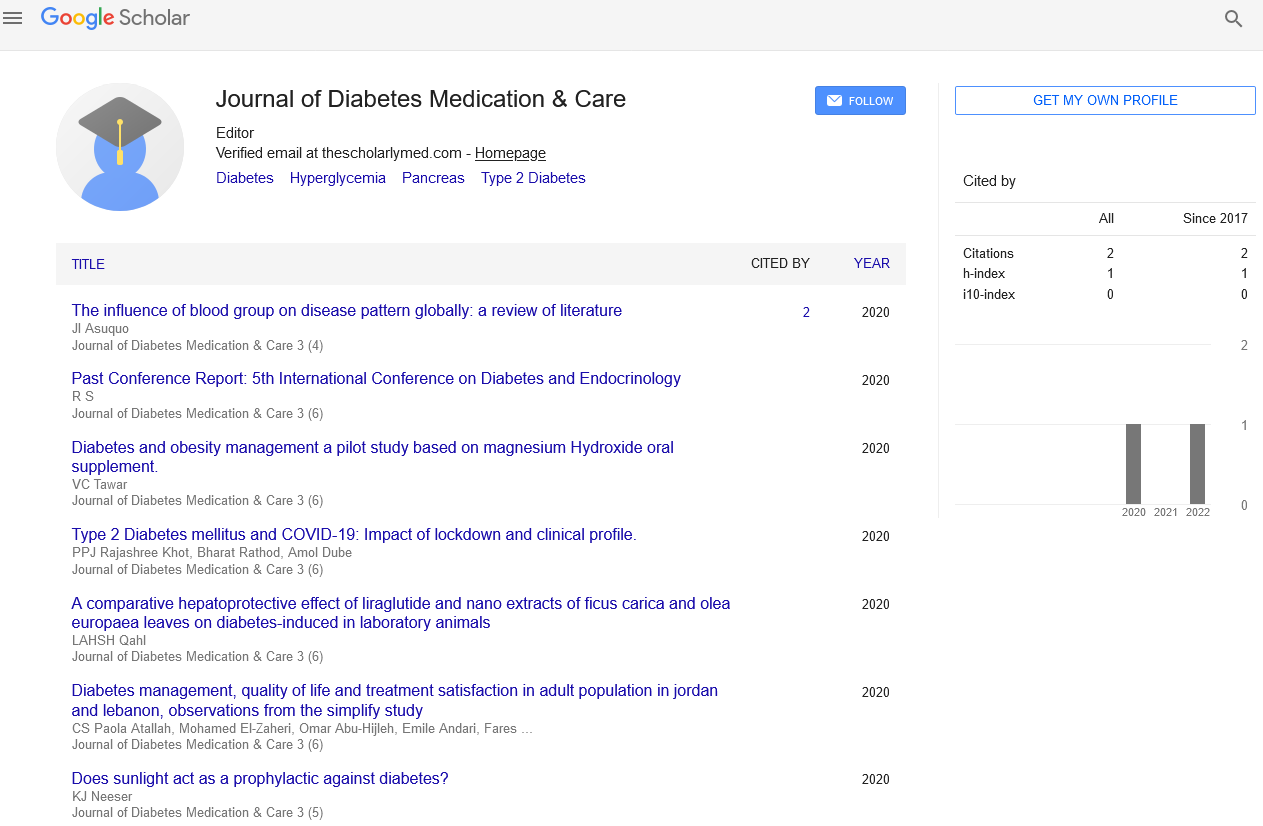Opinion Article - Journal of Diabetes Medication & Care (2024) Volume 7, Issue 1
Innovative Approaches to Diabetes Management: Beyond Conventional Therapies
- Corresponding Author:
- Darie Riza
Department of Endocrinology, Bahir Dar University, Bahir Dar, Ethiopia
E-mail: dsrrie.rizzo@maca
Received: 05-Jan-2024, Manuscript No. JDMC-24-124931; Editor assigned: 08-Jan-2024, PreQC No. JDMC-24-124931 (PQ); Reviewed: 22-Jan-2024, QC No. JDMC-24-124931; Revised: 29-Jan-2024, Manuscript No. JDMC-24-124931 (R); Published: 05-Feb-2024, DOI: 10.37532/JDMC.2024.7(1).172-173
Introduction
Diabetes, a chronic metabolic disorder characterized by elevated blood sugar levels, affects millions of people worldwide. Traditional approaches to diabetes management typically involve medication, insulin therapy, and lifestyle modifications. However, in recent years, researchers and healthcare professionals have been exploring unique and innovative therapies that go beyond the conventional methods. These ground-breaking approaches aim to provide more effective and personalized solutions for individuals living with diabetes.
Description
Gene therapy: Rewriting the diabetic code
One of the most promising and revolutionary advancements in diabetes therapy is gene therapy. This approach involves altering or replacing faulty genes responsible for diabetes development. Researchers are exploring ways to enhance insulin production or improve insulin sensitivity through gene manipulation. Although gene therapy for diabetes is still in its early stages of development, it holds great potential for transforming the way we treat and manage the condition in the future.
Artificial pancreas: Mimicking nature’s design
The artificial pancreas is a cutting-edge technology designed to replicate the functions of a healthy pancreas. Consisting of an insulin pump and continuous glucose monitoring system, this device automatically adjusts insulin delivery based on real-time blood glucose levels. By closely mimicking the body’s natural insulin regulation, the artificial pancreas helps maintain optimal blood sugar levels, reducing the risk of hyperglycemia and hypoglycemia. This innovative approach offers a more seamless and precise way of managing diabetes, enhancing the quality of life for those affected.
Islet cell transplantation: Restoring balance
Islet cell transplantation involves harvesting insulin-producing cells (islets) from a donor pancreas and transplanting them into the pancreas of a person with diabetes. This procedure aims to restore the body’s ability to produce and regulate insulin naturally. While islet cell transplantation is still considered an experimental treatment, ongoing research and advancements in transplantation techniques show promise in making this therapy more widely available and effective in the near future.
Microbiome modulation: Harnessing the power of gut health
The human microbiome, consisting of trillions of microorganisms living in the gut, plays a crucial role in overall health, including metabolic function. Recent studies have revealed a connection between the gut microbiome and diabetes. Researchers are exploring ways to modulate the microbiome to improve insulin sensitivity and regulate blood sugar levels. Probiotics, prebiotics, and fecal microbiota transplantation are some of the approaches being investigated to optimize the gut microbiome and potentially provide new avenues for diabetes management.
Nanotechnology: Precision in diabetes treatment
Nanotechnology involves manipulating materials at the nanoscale, and its application in diabetes management is gaining attention. Nano-sized drug delivery systems allow for precise targeting of insulin delivery to specific cells, reducing side effects and improving overall treatment efficacy. Nanotechnology also holds potential in developing advanced glucose monitoring devices with enhanced sensitivity and accuracy. As this field continues to evolve, it may revolutionize the way we administer and monitor diabetes therapies.
Mind-body interventions: Holistic approaches to diabetes care
The mind-body connection is a powerful aspect of health, and incorporating holistic approaches into diabetes management is gaining recognition. Practices such as mindfulness meditation, yoga, and biofeedback have shown positive effects on reducing stress, improving insulin sensitivity, and promoting overall well-being. Integrating these mind-body interventions into diabetes care can complement traditional therapies, addressing not only the physical but also the emotional aspects of living with a chronic condition.
Personalized medicine: Tailoring treatment to individuals
The era of personalized medicine is transforming healthcare, and diabetes management is no exception. Advances in genetics, biomarkers, and data analytics allow healthcare providers to tailor treatment plans based on an individual’s unique genetic makeup, lifestyle, and metabolic profile. Personalized medicine aims to optimize therapeutic outcomes by providing targeted interventions that address the specific needs of each person with diabetes, leading to more effective and efficient care.
Conclusion
In the quest for more effective and personalized diabetes management, researchers and healthcare professionals are exploring a diverse range of innovative therapies. From gene therapy to artificial pancreas technology, microbiome modulation, nanotechnology, and mind-body interventions, these approaches represent the cutting edge of diabetes research and treatment. As these innovations continue to evolve, they offer hope for a future where diabetes can be managed more effectively, improving the lives of those affected by this prevalent chronic condition. Embracing a holistic and personalized approach to diabetes care may pave the way for a new era in the treatment of this complex metabolic disorder.

